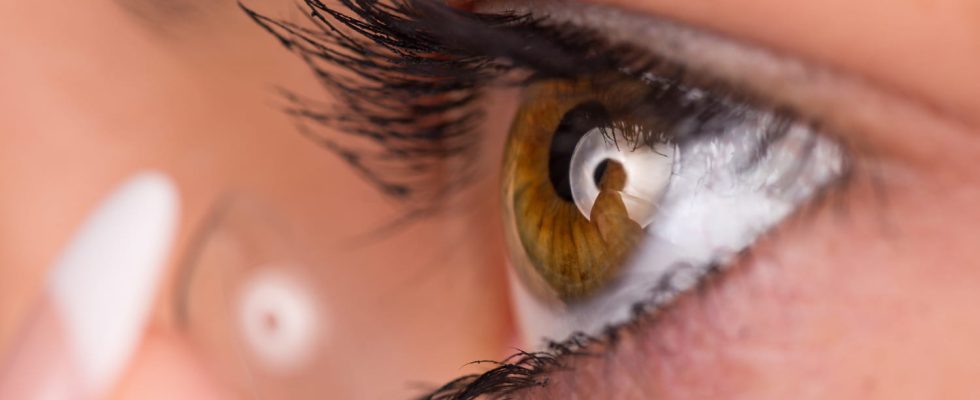Keratoconus is an eye disease that results in progressive thinning of the cornea and impaired vision. Update on the causes, diagnosis and treatment with Dr. Pierre Quéromès, ophthalmologist surgeon specializing in retinal diseases.
Definition: what is keratoconus?
Keratoconus is a degenerative eye disease which is characterized by a corneal deformation, which corresponds to the transparent anterior part of the eye. “Normally, the cornea is spherical while in case of keratoconus, it takes a pyramidal aspect. The cornea is revealed abnormally deformed, irregular and bulging forward. Keratoconus results in a progressive thinning of the cornea. According to studies, the prevalence of keratoconus is estimated between 1 in 500 and 1 in 2000“, says Dr. Pierre Queromès, ophthalmic surgeon specializing in retinal diseases. Both eyes are usually affected. The diagnosis is based on the corneal topography : a photo of the cornea that shows the thickness, curvature and astigmatism of the cornea.
What causes keratoconus?
The causes of keratoconus are not clearly identified to date. In addition to a genetic predispositionsome factors environmental could favor the occurrence of this phenomenon.
What are the symptoms of keratoconus?
In some cases, keratoconus is asymptomatic. It is discovered fortuitously during additional examinations carried out by the ophthalmologist. Classic symptoms of keratoconus include visual blurring and distorted vision due to astigmatism, discomfort with light (photophobia) which result in watery eyes. In the most severe cases, keratoconus can lead to significant vision loss, associated with a corneal thinning and pain.
What are the stages of evolution?
There are 4 stages of evolution of keratoconus, depending on the symptoms it causes:
- Stage 1: visual discomfort with decreased visual acuity and astigmatism;
- Stage 2: myopia associated with astigmatism;
- Stage 3: visual disturbances worsen and are accompanied by a visible deformation of the cornea;
- Stage 4: loss of corneal transparency which becomes a little opaque.
What are the treatments for keratoconus?
Keratoconus treatment includes two phases: a treatment that aims to slow down the progression of the disease and a treatment which consists improve comfort and vision of the patient. “The first reflex to adopt to prevent the disease from getting worse is stop rubbing your eyes because the rubbing of the hand and fingers across the eyelids aggravates astigmatism and creates keratoconus. In parallel, drops may be prescribed to moisturize and wash the eyes“, warns the eye surgeon. antihistamines may also be given to limit scratching. The correction of vision by wearing glasses and contact lenses also plays an important role in healing keratoconus. Currently, another treatment divides the specialists: the cross linking of collagen corneal. “It involves depositing drops on an eye and then putting UV rays on the eye to try to stiffen the cornea and thus avoid an evolution and a continuous deformation of the cornea, in particular by astigmatism.“, explains Dr. Pierre Quéromès. The treatment of vision loss includes regular monitoring by an ophthalmologist, the wearing of eyeglasses and lentils.
Rigid contact lenses are the most suitable
What does keratoconus surgery involve?
A surgical treatment with intracorneal rings can be proposed in case of intolerance to lentils of contact. It involves slipping a ring a few millimeters into a layer of the cornea in order to reshape it and reduce astigmatism. In cases of corneal deformities and very significant corneal opacities, a partial or total corneal transplant can be offered. It is therefore an organ donation but does not require compatibility.
Which lenses for keratoconus?
“THE rigid lenses are the most suitable for improving astigmatism and corneal deformities. In case of intolerance, soft lenses can be proposed but the result will be less effective“notes the ophthalmologist.
Thanks to Dr. Pierre Quéromès, ophthalmic surgeon specializing in retinal diseases. He practices at the Quinze-Vingts National Ophthalmology Hospital Center and at the OPH78.
